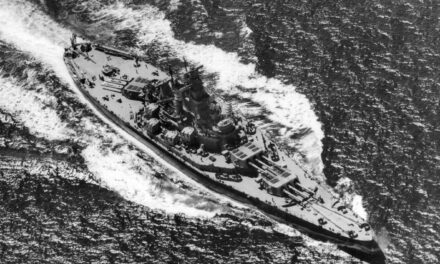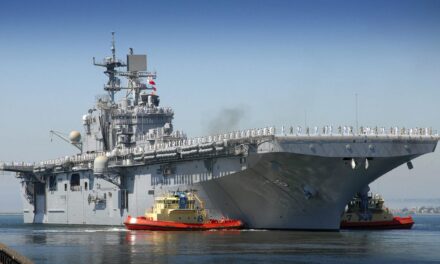We support our Publishers and Content Creators. You can view this story on their website by CLICKING HERE.
Would Donald Trump Really Take the Panama Canal? Not Exactly. Incoming President Donald Trump frequently threatened smaller countries and US allies during his first presidential term. This is one of his most unfortunate strategic behaviors. Basic intuition suggests that allies and partners help states project power, fend off challenges, and, if necessary, win wars. Both international relations theory and diplomatic history suggest this, as does the course of U.S. history. US allies played essential roles in securing World War I and II victory. They also aided in the Cold War and War on Terror’s long twilight struggles. In America’s looming struggle with China, partners will likely once again serve US national interests.
Donald Trump, The Bully, Is Back
So Trump’s recent threats leveled at nearby countries – Panama, Mexico, Canada, and Danish Greenland – are a disappointing return to form.
He suggested, for example, that Canada might like to join the U.S. as its fifty-first state. Were this remotely accurate, Canada has had a century to act on this impulse and has chosen not to. It is also wildly inappropriate for the U.S. president to suggest another country surrender its sovereignty.
This may seem irrelevant – typical Trumpian trolling – but since Trump will likely not act on his remarks, they serve no purpose other than to upset America’s neighbor with whom the U.S. shares a very long border and who has assisted America in conflicts for a century.
Alienating Canada serves no apparent strategic interest, but if it encourages Canada to pull back on cooperation – in NATO, in the Pacific, over the Great Lakes, and so on – then it hurts US interests. Bluster, for its own sake, is more like a dominance display for Trump’s psychic satisfaction than a strategic act.
The Strange Panama Canal Theat
Nowhere is the pointlessness of these threats more evident than in Panama, which Trump has recently threatened over canal access.
It is correct that Panama Canal access is strategically essential in a long-term naval competition with China. But China is on the other side of the Pacific Ocean – almost halfway around the world. For Beijing to project power to Central America, in force great enough to control the canal, would be a remarkable feat far beyond any reasonable assessment of China’s maritime capabilities. China struggles to project power into the nearby East and South China Seas, much less out to Guam or Hawaii. To reach Panama is a reach, to say the least.
China could indeed damage or even destroy the canal with missile strikes, probably from submarines and possibly with nuclear weapons. This is a credible contingency that the US should factor into planning for a full-scale Sino-U.S. conflict. However, direct US control of the Panama Canal would not mitigate this problem. Missile defense – not territorial control – is the issue in this scenario, and missile defense problems are well-known.
Finally, with direct territorial control of immediate strategic consequence, the US could far more easily project power into Panama than China could. During World War II, the British and Americans took Iceland to prevent Nazi military control. In dire Sino-US circumstances, the US could do something like that again in Panama. But talking up such extreme and unhappy scenarios serves no strategic purpose. It alienates Panama for no reason and encourages China to develop canal zone contingencies based on US anxieties. It should also be noted that a US peacetime move on the canal would likely provoke armed resistance, even an insurgency – precisely the type of ‘forever war’ Trump promised to end.
Cooperation is What Separates the U.S. from China
Trump has talked in a similarly belligerent manner about Greenland and Mexico. He has intimated that the US should control Greenland, and his political allies have discussed the US use of force against Mexican drug cartels. Such moves would be hugely disruptive – alienating countries near the US and reducing cooperation on all sorts of shared issues – terrorism, tourism, pollution, trade, etc. And US strikes on Mexico might produce a war and insurgency.
As always with Trump, though, this language appears to be bluster. Few think Trump would invade Panama or Mexico. But his willingness to talk like this has costs. Specifically, Trumpian belligerence drives away potential allies in America’s rising cold war with China. As in the first Cold War, both belligerents realize the risk of direct conflict. Instead, competition will be expressed through alignment. In Asia mainly, China will try to convince countries to accept its regional leadership, arguing that the US is a foreign interloper and a hypocrite who violates its own ‘liberal international order’ (LIO) rhetoric.
Former President of the United States Donald Trump speaking with attendees at the 2023 Turning Point Action Conference at the Palm Beach County Convention Center in West Palm Beach, Florida.
Trump’s belligerence toward small and US-friendly states bolsters that impression of hypocrisy and distrust. Without its liberal commitments, the US is just another powerful state. Without a commitment to the LIO and restrained behavior to match, there is no reason for countries to align with the US any more than with China.
In other words, it is US liberalism and respect for different countries – the exact values Trump’s rhetoric undercuts – that encourages states to align with Washington.
But Trumpian America will bully small states just like China will, then the US and China are the same. Intermediate states will have no particular cause to align with the US, and the costs to the US of competition with China will grow as potential allies either drop out or align with China for a better deal. Trump should stop talking like this.
About the Author: Dr. Robert E. Kelly
Dr. Robert E. Kelly (@Robert_E_Kelly; RoberEdwinKelly.com) is a professor in the Department of Political Science at Pusan National University and a 19FortyFive Contributing Editor.

 Conservative
Conservative  Search
Search Trending
Trending Current News
Current News 





